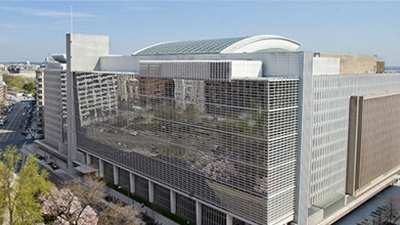Inside its Washington, D.C., headquarters, the World Bank Group aims to live its sustainable development mission.
The Bank, the third-largest employer in the District of Columbia, has a large physical presence in the city, with offices spread across four owned building and several leased facilities in the downtown core. It also has robust programs targeting energy use and waste to keep the environmental footprint of all those buildings in check.
World Bank Group President Robert Zoellick has now taken the Bank’s efforts a step farther by putting its promise to pursue principles of sustainability to paper.
Zoellick recently signed a copy of the District of Columbia’s Environmental Performance, Climate, and Sustainability Pledge. The commemorative copy of the pledge, also signed by D.C. Mayor Vincent Gray, was posted prominently this week inside the Bank’s headquarters.
The pledge calls on the Diplomatic Missions and International Institutions in the District to commit to efforts that will advance a number of specific goals outlined in the document — all aimed at promoting sustainability practices, demonstrating environmental leadership, and supporting the District's own efforts.
It is part of an ambitious program to strengthen the sustainability focus of the city. Over the past few years, the D.C. Greening Embassies Forum, led by the U.S. State Department, has coordinated numerous sustainability events and workshops to support the diplomatic community and the District. More than 40 Washington-based diplomatic missions have signed the pledge.
“The World Bank Group is proud that it is already doing almost all of what is addressed in the document,” said Hartwig Schafer, director for Strategy and Operations, Sustainable Development, at the World Bank.
“Signing the Pledge offered us an opportunity to showcase the partnership with the city of Washington and the D.C.-based international community in efforts to decrease corporate environmental footprint and improve sustainability reporting,” Schafer said. “We believe that managing and reducing our environmental impact is essential to sustainable development and to good business.”


